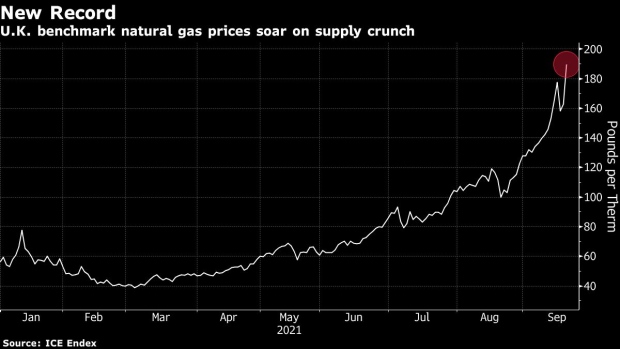Sep 21, 2021
U.K. Warns of Challenging Few Days as Energy Crisis Deepens
, Bloomberg News

(Bloomberg) --
U.K. Business Secretary Kwasi Kwarteng warned the next few days will be “quite challenging” as the energy crisis deepens, and meat producers struggle with a crunch in carbon dioxide supplies.
“The next few days are going to be quite challenging,” Kwarteng told Sky News. “This is very serious.”
Gas prices are surging, unhedged electricity suppliers are at risk of failing and the usual mechanisms for protecting customers from the chaos aren’t working --meaning some kind of government bailout will be needed. Meat producers are warning they have just days of carbon dioxide supply left, threatening additional kinks in food supply chains that are already stretched.
Adding to pressure on energy prices, a cable that was knocked out last week after a fire at a converter station won’t be coming back online for another month. National Grid said late on Monday that half the capacity of the IFA-1 U.K.-France line will come online Oct. 23, a month later than previously thought. Full capacity of 2,000 megawatts is not expected until March 27.
Kwarteng also said:
- He hopes for a solution to the carbon dioxide crisis this week
- More than 5-8 energy companies could go under this winter. He doesn’t want to use taxpayer funds to bail them out
- As he seeks new suppliers to take on those companies’ customers, state-backed loans for energy companies are one option on the table
Europe is facing a shortage of gas, following a longer and colder winter than usual, and Russia keeping a lid on supplies to the continent. Asia has also attracted liquefied cargoes of the fuel, keeping the market tight. In the U.K., surging energy prices have caused five suppliers to go under in the past few weeks.
With higher prices continuing to squeeze suppliers, the government needs to ensure that there isn’t a cascade of bankruptcies that causes chaos in markets and to consumers, particularly the vulnerable. The usual mechanism of handing a failed company’s customers to another firm is being tested this year as market prices mean it’s not profitable for companies to come to the rescue.
©2021 Bloomberg L.P.


